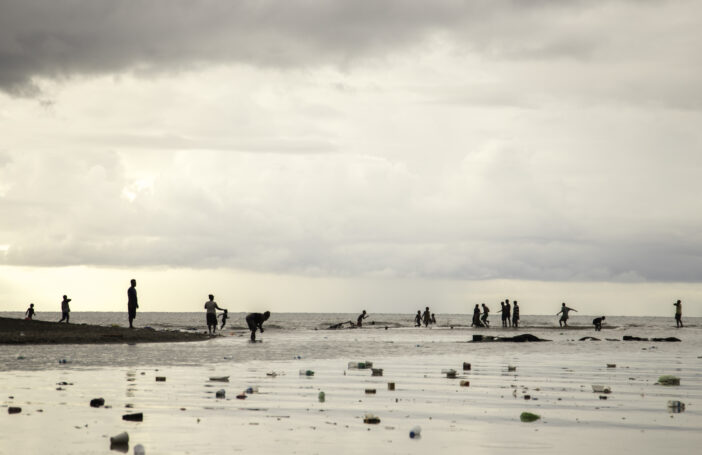There was a time when Australia lectured the Pacific. John Howard said in 2004 that Australia had a “special responsibility” to help the Pacific but that we sought “reforms and better governance as conditions of that assistance.” Those days must seem a long time ago to the current Australian Prime Minister Scott Morrison, who has been attending this year’s Pacific Island Forum in Tuvalu. In a complete role reversal, the Pacific now lectures Australia to do more on climate change. And fair enough too. Australia should do more on climate change. Our emissions are still rising.
The days of Australia hectoring the Pacific are unlikely to return. Now we just want to be part of the family, and regarded as more so than China. Nor are those days to be missed. Perhaps our intentions were good, but we overestimated our ability to bring about change. When, with a few notable exceptions, that change didn’t happen, our lecturing grew repetitive and annoying to those on its receiving end. Moreover, the aid put forward in support of our overly-ambitious reform hopes began to appear wasteful, and of more benefit to the consultants and public servants who provided it than the countries who were meant to benefit. If we were serious about helping the Pacific, we would have tried more practical approaches, such as the promotion of labour mobility which we are now, belatedly, pursuing, but which in the Downer-Howard “governance first” days was taboo, and regarded as a distraction from the main reform game.
And, yet, something has been lost. We might have gone about it the wrong way, but Australia was right to be concerned about governance in the Pacific.
The World Bank publishes annual updates of its list of fragile states, or “fragile situations”. This has nothing to do with climate change. The Bank rates as fragile poor countries (the 76 countries eligible for its concessional funding) based on assessments undertaken by both it and one of the regional banks (either the Asian or the African Development Bank) of the strength of a country’s policies and institutions. Developing countries are rated as fragile if they get an average governance score from the two institutions of less than 3.2 out of 5.
Fragility lists have been published by the Bank for every year since 2006, but data completeness at least for the Pacific seems to have been an issue prior to 2012. After 2012, there are minor changes every year, but overwhelmingly the story is the same, year after year. For this post, I draw on the Bank’s most recent list, published in mid-2018. In that list, out of the 76 countries assessed, 27 (about one-third) are rated as fragile due to having governance scores of less than 3.2 (i.e., poor governance).
Ten Pacific nations are included in the Bank’s annual fragility assessment exercise. Six are rated fragile. They are (starting at the bottom): the Marshall Islands (2.74), the Federated States of Micronesia (2.82), Papua New Guinea (2.91), Tuvalu (2.96), Kiribati (2.97), and Solomon Islands (3.08). Niue, Palau and Cook Islands are too rich to be included in the exercise, and are in any case far from fragile. Fiji, Samoa, Tonga and Vanuatu are, to their credit, assessed as non-fragile. Nauru would be rated as fragile if it were assessed. (It is not a member of the World Bank, but is of the ADB, and the latter rates it as the worst governed of all Pacific countries.)
Credit to the Pacific countries who have kept off the list, or graduated from it, in the case of Tonga and Vanuatu. But overall the results are worrying. The Pacific Islands Forum represents 14 Pacific island nation states (plus Australia, New Zealand and two French colonies). Of the 14, seven are fragile due to poor governance (the World Bank six plus Nauru). So, half compared to the global average of one-third.
It’s no surprise that Asia does much better than the Pacific. There are only three Asian countries with governance scores of less than 3.2: Timor-Leste, Afghanistan and Myanmar. It’s more surprising that Africa does better than the Pacific. Yes, Africa has the only countries in the world with governance scores below two: South Sudan on 1.69, and Eritrea with 1.99. But in total only 16 out of the 39 African countries examined get governance scores of less than 3.2: about 40%.
That the Pacific emerges from this analysis as perhaps the world’s worst governed region is not a matter of being judgemental, or of allocating blame. There are any number of reasons why governance is poor on average in the Pacific. And improving governance is, at best, a slow process.
Nor is it something that donors can fix, whether by lecturing or by aid. The history of global aid shows that, as does Australia’s own experience. Indeed, in some ways, aid can make governance worse: something that has been completely forgotten in the current rush to give. Regional agencies can sometimes help, though efforts by the African Union to introduce “peer review” mechanisms sounded promising at the time, but have not delivered. Ultimately, domestic governance is a matter for each country to determine.
What certainly doesn’t help is when the problem is denied. At a recent speech, Pacific Islands Forum Deputy Secretary Cristelle Pratt said
“Of course, Pacific Islands Countries face challenges. But we are not fragile and we are not failing. Our Blue Pacific narrative has strengthened our resilience and regional solidarity enabling a paradigm shift from being small, vulnerable, fragile states to one of a Blue Pacific continent consisting of large oceanic states.”
I’m a fan of the Blue Pacific narrative. The ocean is a source of wealth for the Pacific region and a critical pathway to overseas jobs. But that doesn’t change the listings, and the fact that half the independent Pacific island countries are fragile due to poor governance.
All countries face both external and internal challenges. The risk of too great a focus on the external (in this case, climate change) is that it deflects attention from the internal. And it is the internal challenges that the Pacific countries have the best chance to actually do something about. Better governance makes everything easier. It provides a stronger foundation for responding to climate change. More importantly, it provides a basis for facing down the many other serious problems many countries in the Pacific face, from non-communicable disease epidemics to low levels of effective literacy to high levels of unemployment to drug trafficking to dealing with natural disasters and multiple aid donors.
The days of Australia lecturing the Pacific on poor governance are gone. But that doesn’t mean that poor governance itself has disappeared. New narratives can be useful, and external threats are important, but neither should be allowed to obfuscate the clear governance weaknesses that many Pacific countries suffer from. I hope for the sake of the Pacific people that the fundamental challenge of governance reform, once championed by Australia, is one day soon taken up by the region’s leaders and peak bodies.
Note: A country can also be rated as fragile even if it gets a governance score of above 3.2 if its instability has led to the arrival of a peace-building or peace-keeping mission. Some African and some Middle-East countries are rated as fragile for this reason (8 in total). I ignore this in the analysis since (a) my focus is on governance and (b) all developing countries, even rich ones, can be rated as fragile for this reason, which complicates the analysis of ratios. Also, no governance score is provided for Somalia or Syria, both of which are rated as fragile. For the analysis, I assume that the former has a governance score of less than 3 and the latter less than 3.2.





I think from the third sentence in the second paragraph nails it. Clear and simple.
What we call governance others might call culture and in a place like Papua New Guinea that’s a gulf way too wide to bridge. Only in a parallel universe far away is there a PNG public service supported by an elected legislature that shares our ideas of governance and equity. Our government can continue to throw money at the system it bequeathed in 1975, but I doubt it will make an iota of difference in the end.
What happens at the level of executive government or a government department should be none of our business. If we continue to push for different outcomes our relationship with our closest neighbour will fracture completely and other actors with a different world view will step in.
In this paradigm economic and human capital development is always local and has to be driven from the bottom, not the top.
If you think economic empowerment at the lower tiers of society is important for greater resilience and a better life, then work with those who have community support and are already successfully doing this.
If you want to support human capital development, support the entities that work on this at community level and have the undoubted respect of the communities they serve.
Only then will those that have continually missed out on the fruits of “development” be in a position to demand the changes from within that we have failed to achieve from without.
Since that might sound like interference in an independent state, set up a mechanism to buy fresh food produced at community level for sale in the Australian market and support it to grow into an economic platform to empower 10 or is it 15 million people who currently have little agency or prospect of same over the lives they lead.
You may wish to continue to glad hand the big men that sit in parliament and on the boards. But know the power they enjoy comes from you – not their own people. They are without exception the creation of your system. You the policy planners have the means to change that.
Thanks Stephen. I’m reminded of a useful insight from Roderick Beaton’s Greece: Biography of a Modern Nation – “If you cannot trust anyone to whom you are not related either by blood or by marriage, then you can rely on them only if you can bind them to you by an equivalent obligations. …those who honour their obligations are the most respected members of the community. …its a self maintaining system….on the one side it entails giving of gifts and other other bestowal of patronage. In the context of modern, democratic and accountable institutions, this pre-modern system has become known as ‘corruption’. In the absence of these institutions, or where they remain weak and underdeveloped, it is a mechanism for survival”
Just looking at these numbers now and, although I don’t disagree with your overall point, I wonder about the metric:
Haiti scores better than FSM and the Marshall Islands.
The Democratic Republic of the Congo scores better than Kiribati, Tuvalu and PNG.
Very informative